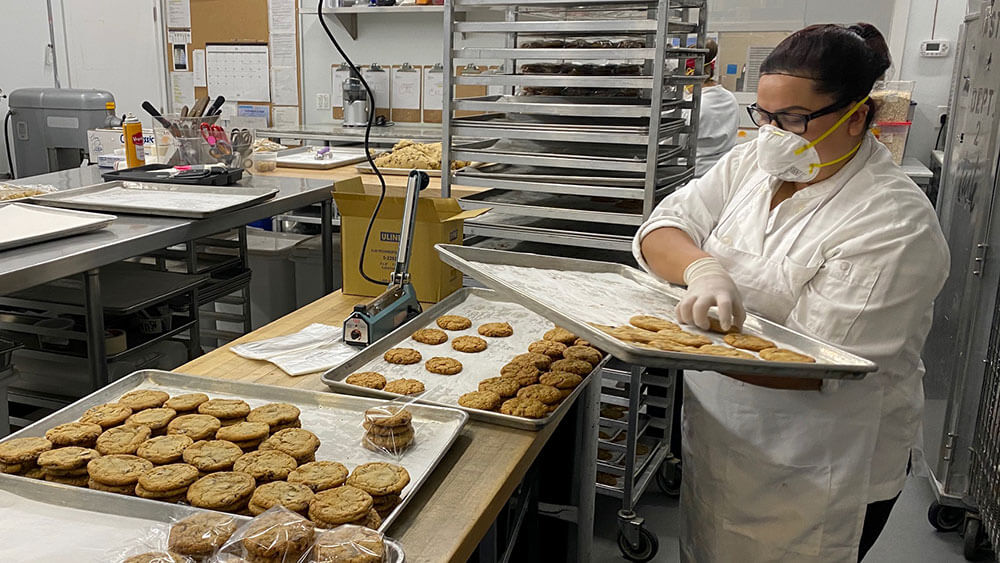
A team member of Taste Catering and Event Planning bakes cookies for the thousands of meals the company churns out daily at its Millbrae facility in San Francisco. (Courtesy Taste Catering)
March 13, 2020 is a day Margaret Teskey says she’ll never forget. It’s the day she was forced to furlough 350 employees from her company, Taste Catering and Event Planning. For more than 40 years, Taste has been a fixture in the San Francisco Bay area, catering events for companies like Apple, Google, and Facebook. Almost overnight, those events disappeared. “It was so unexpected,” Teskey said, and it happened “so quickly.”
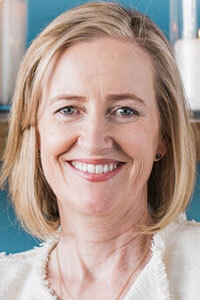
Margaret Teskey
As of April 2, California had reported 1.9 million unemployment claims, with many of them coming from the service industry. Teskey says that hourly workers in this line of work often live paycheck to paycheck. “I feel like this week they will be fine, but what about week two? Week three? And week four?” she said. “They’re the silent majority that are going to [become] the next wave of homeless people.”
That weekend, it hit her: She had an opportunity to do something about it. She reached out to clients, family, and friends, and the donations started to roll in — enough to pay a crew of 20 to start producing meals in Taste’s 19,000-square-foot facility in Millbrae. She asked longtime partner Meals on Wheels San Francisco (MOWSF) and Foodrunners San Francisco to join the effort, with MOWSF acting as fiscal sponsors and Foodrunners serving as the distributor, delivering the meals to area hospitals, not-for-profit shelters, food banks, family service centers, elderly food service programs, and other sources. Together, they formed Hospitality Helps.
In addition to getting food to the vulnerable populations who need it most urgently, Teskey hopes their initiative will allow her to eventually hire back those furloughed employees. However, “the key is, we need to get funded. This can’t be our model forever,” she said, adding that, funding or not, they will continue to donate meals for as long as it’s financially feasible. So far, they’ve received more than $370,000 in funding and have sent out more than 21,000 meals — about 4,100 a week. Teskey says her facility has the capacity to produce several thousand meals per day, but they need more funding to scale up to a bigger production model.
‘It’s Like They Unplugged Our Guitars’
The situation is going to get worse before it gets better, Teskey said. She’s already seeing the demand for meals growing as more people lose their jobs, and shelters are “bursting at the seams, especially with women and children.” Teskey emphasized that now more than ever, financial support from government agencies, foundations, or other potential benefactors will go a long way in helping local groups like Hospitality Helps continue its work. “Real progress can only be made when our local community,” she said, “takes care of their own.”
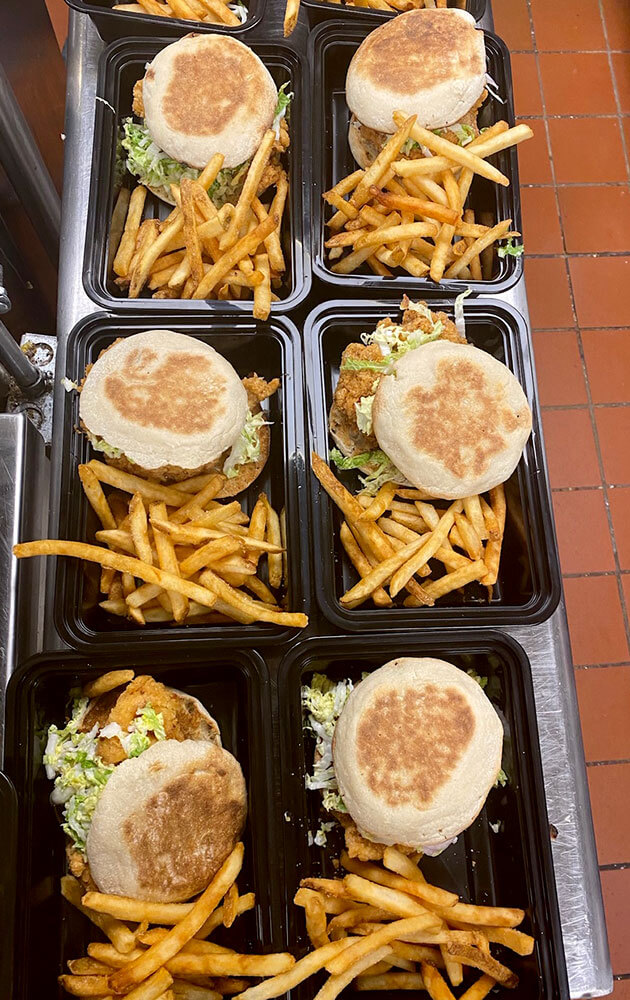
A small team from David Burke at Orange Lawn in South Orange, New Jersey, is making around 600 sandwiches and wraps and delivering them to Saint Barnabas Medical Center in Livingston. (Courtesy David Burke)
On the opposite coast, David Burke, James Beard Award–winning chef and restaurateur, is facing a similar predicament. Last week, he launched David Burke Feed the Heroes. “We just want to feed people in need,” Burke said during a phone call from his New Jersey home. But he, like Teskey, needs cash flow and is currently seeking donations to keep paying a few employees to churn out meals for health-care workers and first responders.
This isn’t the first time Burke has set out to feed those on the front line of a crisis. He did it after 9/11, and again in 2012 after Hurricane Sandy. But this situation, he said, is remarkably different. It’s global. It’s uncertain how long it will last. And in the meantime, all of his revenue streams — which includes his dozen restaurants and catering arm, David Burke Caterers — have been shut off. “We’re not used to sitting. When we’re asked to help, that’s what we want to do,” Burke said. “But it’s like they unplugged our guitars.”
Right now, two to three times a week, a small team at David Burke at Orange Lawn in South Orange, New Jersey, is making around 600 sandwiches and wraps — because “[health-care workers] don’t have time to sit down,” Burke said — and delivering them to Saint Barnabas Medical Center in Livingston, New Jersey. He has since expanded his efforts to serve a rotating roster of New Jersey hospitals, police and fire stations.
Meals are prepared and delivered weekly to two members of the roster, which can reach 1,000 meals a week. Burke plans on giving donors gift cards to his restaurants; that way, it goes back into the pot. “We know we’re going to open. We have to think that way. We have to be positive.”
Burke also partnered with Re-Think Food NYC to prepare meals that the organization distributes to those in need, from the homeless to healthcare workers. The effort began May 6 with delivery of 400 meals a day, but is set to grow to as many as 1,600 to 2,000 a week within three weeks time.
‘It’s Changing so Rapidly’

Shaun Roberts
A few miles away from Burke in New York City, Shaun Roberts, vice president of sales at catering company Great Performances, is establishing a new normal. Every day, he and his team now “meet” daily via phone call to tackle their new mission — feeding those on the front lines of the United States’ COVID-19 epicenter. “Every day there’s something new to focus on,” Roberts said. “It’s changing so rapidly.”
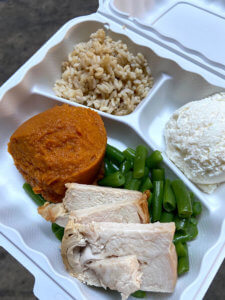
Bronx–based Great Performances is delivering a variety of meals to health-care workers in New York. (Courtesy Great Perfomances)
The Bronx, New York–based company caters some of the toniest events in New York City — CFDA Fashion Awards and the TIME 100 Gala, for instance. Since late March, its focus has been on churning out 40,000 meals per week to feed seniors and other vulnerable populations in the New York City area. In early April, Great Performances partnered with The Sylvia Center, a nonprofit that helps young people make healthier choices and learn essential cooking skills, on the center’s Fresh Meal Fund. Through the partnership, the company produces 10,000 meals per week for health-care workers. With a $1,200 contribution from donors to the fund, Great Performances can deliver 100 meals to area health-care workers and make a $150 donation back to the center. Financially, “we are finding that this is sustaining itself,” Roberts said, adding that funds from private and corporate donors through the center has helped to bolster their effort for the time being. However, “The need is great, and the need will continue.”
‘A Drop in the Bucket’
For more than 40 years, Bill Hansen has run one of South Florida’s most prominent catering and event-production companies. His team has served meals to four U.S. presidents and created events for hundreds of companies, from Microsoft to Morgan Stanley. “I am, like everyone else, worried about the future,” Hansen — who was forced to lay off nearly 200 hourly workers — said.
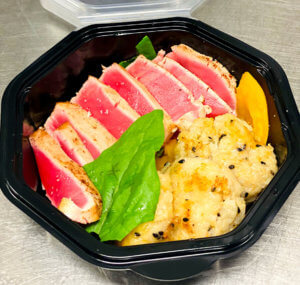
Bill Hansen Catering in Coconut Grove, Florida, created a grab-and-go tuna tataki bowl for officers at the Broward County Sheriff’s Office. (Courtesy Bill Hansen)
In early March, Hansen reached out to the Broward County Sheriff’s Office to offer them at-cost meals. “It fulfills a two-fold purpose,” he said. “They’re getting gourmet meals for $5 to $6 a person; and it’s creating work for my hourly employees.”
Hansen also started a local meal delivery service, something new for the company, as a way to bring in some money. So far, what’s coming in is “a drop in the bucket” — but it’s helping to pay a team of 20 who have stayed on.
What does the future look like? “Things are going to be different,” Hansen said. “Those of us who are smart enough to figure how they’re going to be different, and poised to take advantage of that, will be in great shape.”
Hotel Workers Are Hurting, But Hospitality Groups Are Helping

Ed Grose
Per STR, as of April 1, more than seven out of 10 hotel rooms were empty across the U.S. Nearly 3.9 million total jobs in the hotel industry have either been eliminated or will be eliminated, according to the American Hotel & Lodging Association, and 70 percent of direct hotel employees have been laid off or furloughed. And according to the Harris Poll, it may be awhile until hotels fill back up again — 60 percent of respondents said that they’ll only consider staying in a hotel six months after the curve flattens. Much like food service workers, hourly hospitality workers may soon find themselves in food-insecure situations. In some cities, local hospitality organizations have mobilized food drives and relief programs to provide immediate support.
In late March, the Greater Philadelphia Hotel Association (GPHA) partnered with the Philadelphia Convention and Visitors Bureau Foundation, the Pennsylvania Convention Center, the Philadelphia Hospitality Investment Levy, and Visit Philadelphia to form the Greater Philadelphia Hotel Association COVID-19 Hospitality Workers Relief Fund. Leading the initiative is Ed Grose, executive director of the Greater Philadelphia Hotel Association, who decided that in lieu of a traditional, physical food pantry, offering workers grocery store gift cards would not only be safer but allow recipients to buy items not typically donated to a pantry, like medications or diapers.
So far, they’ve raised $450,000 out of their $545,000 goal. “We’re trying,” Grose said, to get cards “into the hands of the people who need it most.” Recipients mostly include employees of hotels as well as the Pennsylvania Convention Center and the Independence Visitors Center. “It’s not lifechanging,” he added, “but it shows that we’re thinking of them and it’s providing a little bit of help.” To donate, visit the Discover Philadelphia website.
Jennifer N. Dienst is a freelance writer based in Charelston, South Carolina. This story was updated May 7.
What Events Professionals Need to Know About COVID-19
PCMA has created a COVID-19 resources page to help event professionals find reliable information about the pandemic and to share events industry-related resources to ensure they are prepared now and in the future.
